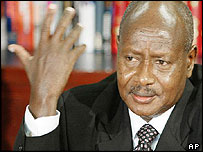Uganda's State Taken Over by a Small Elite, Says UDN

Ugandan President Yoweri Kaguta Museveni;
Is he power hungry despot or a freedom
loving democrat?
By Bamutaki Musinguzi
THE UGANDA Debt Network (UDN) has asked parliament and the government to refrain from amending the constitution, terming the act a manifestation of political corruption.
UDN, an umbrella body at the forefront of fighting corruption, along with other non-government organisations under the umbrella of the civil Society, says that article 74 (2) of the Constitution should be maintained to restrain parliament from amending the presidential term.
It says that the political roadmap should expand opportunities and increase choices for selecting persons with integrity and high morals.
"Corruption should be put high on the national agenda and comprehensive measures should be taken to restore the image of this country in the international community," says a statement by members of civil society attending a workshop on transparency and accountability.
The 16-page report titled, "A Call for a Comprehensive Strategy to Combat Corruption in Uganda" says that Uganda's politics have been characterised by violence, nepotism, patronage and misuse of power. Consequently and by default, some people have become politically powerful and are influencing the course of events in the country, and are seen as role models to be emulated, thus undermining the moral fabric of society and national integrity.
"Over time, a small elite group of people related to each other through marriage, ethnicity, religion and education, who monopolise the political spheres, has been created, thereby undermining the values of democracy and democratic governance," the report says.
For instance, ministers censured by Parliament are reappointed and promoted while those involved in various corruption scandals at national and local levels are neither reprimanded, sacked nor made to resign their positions, it said.
"Because leaders use bribes and coercion to perpetuate themselves in power,
this has tended to undermine the integrity of the state institutions including the army, the courts of law, the police, the judiciary and the legislature among others. "Corruption fuels internecine conflict leading to massive loss of life, displacement, human rights violations, repression, and deprivation. Corrupt leaders in turn use this conflict as a pretext to perpetuate themselves in power," the report warns.
Transparency International has ranked Uganda among the eight most corrupt countries in the world in its latest report. The effects of corruption are diverse and have a far-reaching impact on the society.
According the 2001 Auditor General's report, over Ush200billion ($114.2 million) is lost through embezzlement, diversion and lack of accountability, misappropriation, fraud and outright theft.
Some of the money is meant for provision of social services such as construction of classrooms for the universal primary education programme to cater for over 6 million children in primary schools, health and maternity centres and others.
Although investigations and commissions of inquiry have unearthed massive corruption, with the exception of the Commission of Inquiry into the Police Force, the rest have not been acted upon, hence no action has been taken to bring the culprits to book. Some of the people allegedly involved are senior public officers and highly placed politicians.
For example, the commission of inquiry into the junk helicopters scam discovered that the government lost over $7 million in the deal.
Civil society has therefore recommended that the government make public the findings of all commissions of inquiry into corruption, prosecute and punish all the culprits implicated in the various commissions of inquiry, and functionalise mechanisms to recover monies lost in corruption among other things.
The legal, institutional and policy framework for combating corruption, abuse of office and wastage of public property exists. "However, in spite of the presence of these institutions, corruption continues unabated, partly because the institutions do not have adequate human and financial resources to execute their mandate and partly because the powerful individuals in pursuit of their political and economic interests undermine them," UDN notes.
It is the duty of the government to provide human and financial resources that enable the various anti-corruption institutions to perform their role, the report argues. For instance the office of the Inspector General of Government employs close to 400 officers to investigate cases of corruption countrywide, but this number is still too low to cope with the workload.
The policy of decentralisation is meant to enhance people's participation and democratic control in decision making, to ensure full realisation of good governance at the local level and ensure improved service delivery to the people.
"However, and to a large extent, people's participation is still poor and due to high levels of corruption in local governments, the quality of such services remains very low," the report says.
Local government officials and councillors have been accused of engaging in corrupt acts such as interfering with the tendering process, thereby violating procurement regulations, manipulating the recruitment process and interfering with the work of the district service commissions, diversion and misuse of public property.
"Decentralisation has also become a tool to be used to reward cronies and supporters of the political establishment regardless of their integrity, academic standards and competence.
"Some of these have abdicated their duties and responsibilities. Instead, they use their positions to suppress the public interests and have become a hindrance to the democratisation processes," the report says.
This has resulted in, "Poor and low quality of services; shoddy construction work especially for UPE classrooms; wastage of public resources; and high levels of incompetence among local government employees."
Posted by Hello


0 Comments:
Post a Comment
<< Home